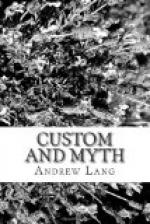Tsui Goab is thought by the Hottentots themselves to be a dead man, and it is admitted that among the Hottentots dead men are adored. ’Cairns are still objects of worship,’ {203a} and Tsui Goab lies beneath several cairns. Again, soothsayers are believed in (p. 24), and Tsui Goab is regarded as a deceased soothsayer. As early as 1655, a witness quoted by Hahn saw women worshipping at one of the cairns of Heitsi Eibib, another supposed ancestral being. Kolb, the old Dutch traveller, found that the Hottentots, like the Bushmen, revered the mantis insect. This creature they called Gaunab. They also had some moon myths, practised adoration of the moon, and danced at dawn. Thunberg (1792) saw the cairn-worship, and, on asking its meaning, was told that a Hottentot lay buried there. {203b} Thunberg also heard of the worship of the mantis, or grey grasshopper. In 1803 Liechtenstein noted the cairn-worship, and was told that a renowned Hottentot doctor of old times rested under the cairn. Appleyard’s account of ‘the name God in Khoi Khoi, or Hottentot,’ deserves quoting in full:—
Hottentot: Tsoei’koap. Namaqua: Tsoei’koap. Koranna: Tshu’koab, and the author adds: ’This is the word from which the Kafirs have probably derived their u-Tixo, a term which they have universally applied, like the Hottentots, to designate the Divine Being, since the introduction of Christianity. Its derivation is curious. It consists of two words, which together mean the “wounded knee.” It is said to have been originally applied to a doctor or sorcerer of considerable notoriety and skill amongst the Hottentots or Namaquas some generations back, in consequence of his having received some injury in his knee. Having been held in high repute for extraordinary powers during life, he appeared to be invoked even after death, as one who could still relieve and protect; and hence, in process of time, he became nearest in idea to their first conceptions of God.’
Other missionaries make old Wounded Knee a good sort of being on the whole, who fights Gaunab, a bad being. Dr. Moffat heard that ‘Tsui Kuap’ was ‘a notable warrior,’ who once received a wound in the knee. Sir James Alexander {204}




